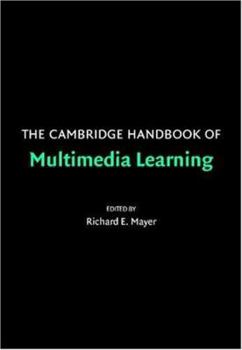The Cambridge Handbook of Multimedia Learning
(Part of the Cambridge Handbooks in Psychology Series)
Select Format
Select Condition 
Book Overview
Digital and online learning is more prevalent than ever, making multimedia learning a primary objective for many instructors. The Cambridge Handbook of Multimedia Learning examines cutting-edge... This description may be from another edition of this product.
Format:Paperback
Language:English
ISBN:0521547512
ISBN13:9780521547512
Release Date:August 2005
Publisher:Cambridge University Press
Length:682 Pages
Weight:2.65 lbs.
Dimensions:1.2" x 7.1" x 10.1"
Customer Reviews
3 ratings
e-Learning Designer's Bible
Published by Thriftbooks.com User , 15 years ago
Every instructional designer who designs for any form of electronic delivery (and this should be just about every ID out there) needs to know this. It should be a standard theory text for any university multi-media ID course. To not be familiar with this research would raise doubts on anyone who considers themself an ID. To teach Multimedia ID and not include this as a fundamental resource, brings into question just what the objectives of such a course could be.
Outstanding Collection of Multimedia Learning Research
Published by Thriftbooks.com User , 16 years ago
This is the single best collection of articles from today's leading researchers in multimedia learning available to date. The book provides an excellent sampling of research associated with how people learn through the combination of words (text and/or audio) and images (still illustrations or photos, animations, and/or video) available. Anyone working in multimedia learning will benefit from gaining a firm understanding of the principles presented throughout this book. The book is divided into five parts: Theoretical Foundations: Foundational learning theories, including cognitive load and how multi-modal message delivery (text/audio and graphics) support learning. Basic Principles of Multimedia Learning: Research supporting key principles in the development of multimedia instruction and achieving multimedia learning, including split-attention principle, modality principle, redundancy, segmentation, coherence, signaling, spatial & temporal contiguity, and personalization. Advanced Principles of Multimedia Learning: Research on the incorporation of multimedia products into a learning approach, including guided discovery, worked-out examples, collaboration, self-explanation, navigation, and prior knowledge. Multimedia in Content Areas: Articles containing guidance for developing multimedia learning environments in various content areas, including reading, history, mathematics, chemistry, meteorology, physical systems, second language acquisition, and cognitive skills. Multimedia Learning in Advanced Computer-Based Contexts: Focuses on multimedia in emerging technologies, including pedagogical agents; virtual reality; games, simulations, & microworlds; hypermedia; and e-courses.
excelent reference
Published by Thriftbooks.com User , 18 years ago
If you want to learn about how we humans can learn better, this book will show you many ways ... using multimedia as a strategy for teaching and learning.





